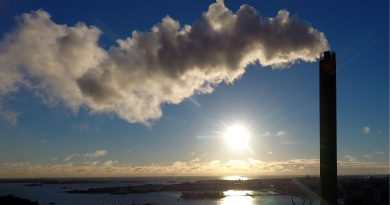Warmest winter ever on the Northern Sea Route

Parts of the region had an average temperature almost 4 degrees Celsius above normal.
The Russian Arctic is becoming increasingly hot. The vast area that covers an overwhelming part of the country is undergoing unprecedented warming. At record speed.
A new climate report (in Russian) from the Russian meteorological institute Roshydromet states that the polar parts of the country have become almost 2.3 degrees warmer over the past 30 years.
And in parts of the region, the heat is gaining breath-taking force. In the Kara Sea, average air temperatures in the period 1998-2018 were as much as 4.77 degrees above normal. In 2018, the biggest temperature deviation was found in the far eastern Chukotka Peninsula where the weather was 3.9 centigrades warmer than normal.
The meteorological institute has measured temperatures in the region since 1938 and never before registered this kind of warmth.
Increased shipping
For the Russian government, the Arctic temperature increase is likely to be perceived with more satisfaction than concern. President Putin has made the Northern Sea Route a top political priority and his so-called May Decrees includes a boom in shipments along the route to as much as 80 million tons by year 2024.
Federal officials are grappling with the task, and the warmer temperatures and rapid shrinking ice might give them a hand.
According to Roshydromet, wintertime air temperatures along the Northern Sea Route have never been as high as in 2018. Since the late 1990s, the winter temperatures in the area has increased with as much as 5 degrees and summer temperatures with 1 percent.
At the same time, the Arctic ice has shrunk considerably. The extension of the polar ice in the area is now four times less than in the 1980s, the report reads.
The trend is making shipping in the area far easier. In January 2019, two new-built tankers crossed the route reportedly without icebreaker assistance.
The Boris Sokolov, a 214 meter long condensate tanker, and the Boris Davydov, a 299 meter long LNG carrier, sailed from China and South Korea to Sabetta in the darkest and coldest part of the year. It was the first voyage of the kind.
Also the permafrost is shrinking. According to Roshydromet, the biggest melting of permafrost has over the last 10 years been registered in the area of Nadym, western Siberia, where 37 centimeters of formerly frozen ground has now been turned to mud.
Warming Arctic
The same overwhelming warming is registered several places across the Arctic. In Svalbard, the Norwegian archipelago, researchers have experienced as much as 100 consecutive months with temperatures above normal.
“Some months have seen temperatures in the area around Longyearbyen with as much as 12-14 degrees over normal,” says climate researcher Ketil Isaksen.
Since 1961, the average temperature at Longyearbyen airport has increased with 5,6 degrees Celsius.
Located at 76° North, Longyearbyen is the world’s northernmost permanent settlement.
If global emissions continue to increase like today, annual average temperature at Svalbard will be above zero degrees by the end of this century, the meteorological institute predicts.
Related stories from around the North:
Canada: The Arctic ‘locked-in’ for 3 to 5 °C temperature rise, UN report warns, Radio Canada International
Finland: U.S., Russia thwarting black carbon reduction efforts in Arctic, says Finland, Eye on the Arctic
Norway: Urgent action needed to protect Arctic Ocean, WWF says, The Independent Barents observer
Russia: The island that disappeared in Arctic Russia, The Independent Barents Observer
Sweden: Sweden ‘too slow’ in meeting emissions goals: climate report, Radio Sweden
United States: Federal judge says U.S. gov must reassess climate impacts of oil leases, Alaska Public Media



